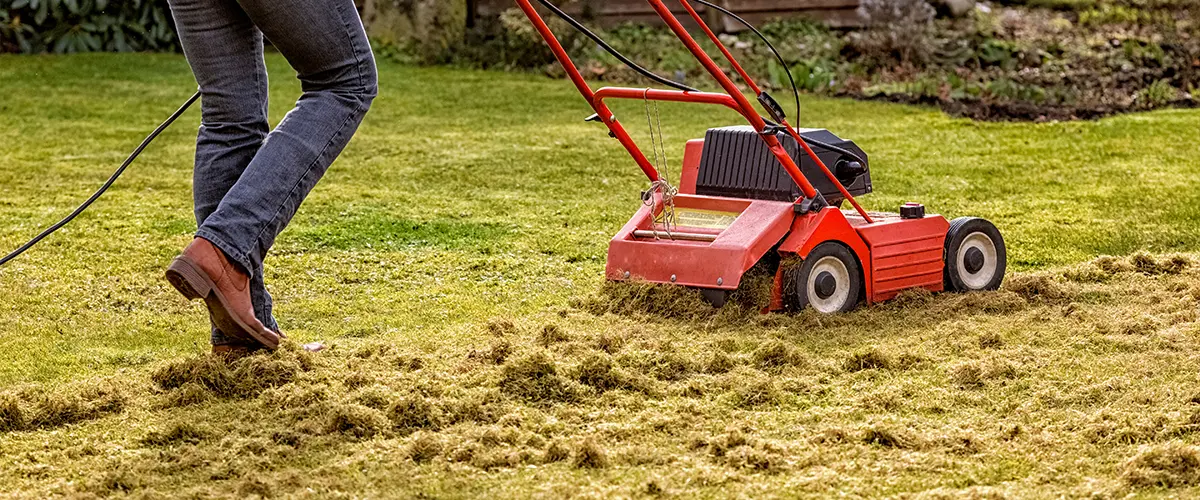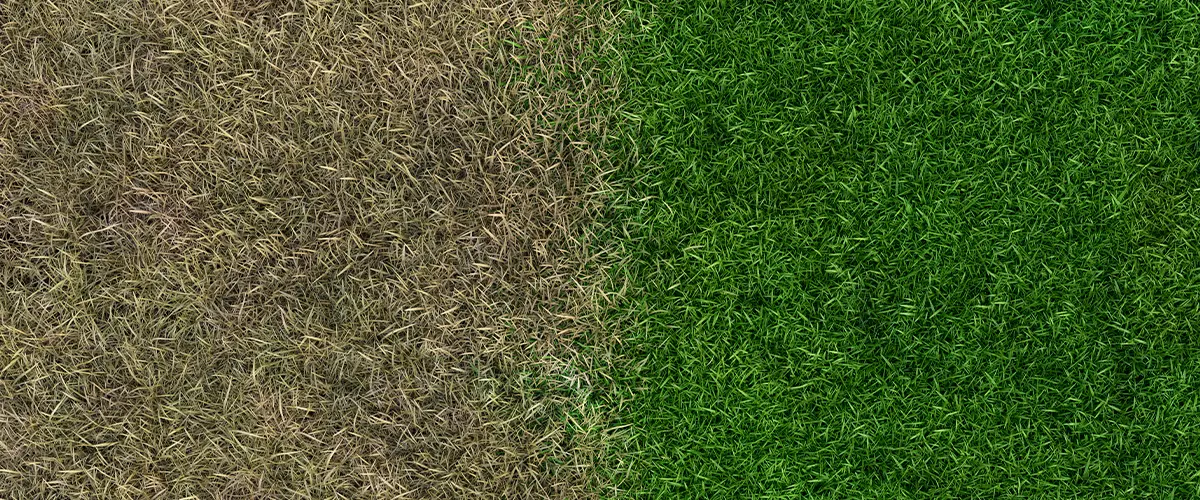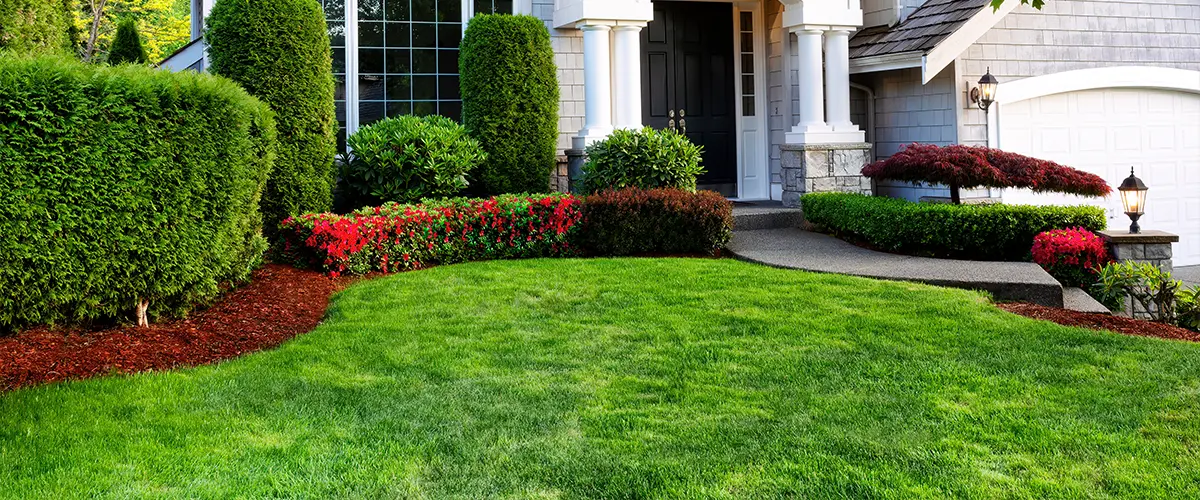Pros And Cons Of Dethatching Lawn In Denver, CO
Having a lush, green lawn is every homeowner’s dream. In Denver, CO, thatch buildup can be a common obstacle to achieving this. This article will explore the benefits and drawbacks of dethatching your lawn to help maintain its health and beauty.
Read on for all you need to know.

What is Thatch and Dethatching?
Thatch is a layer of organic matter that lies between the soil surface and the green grass blades. This layer consists of dead grass, roots, and other plant materials. A thin thatch layer can benefit your lawn by protecting it from extreme temperatures and retaining soil moisture.
But too much thatch makes it hard for water, nutrients, and air to reach the grass roots.
Dethatching removes this excessive layer from your lawn. It involves using tools like a dethatching rake, power rake, or vertical mower to break up and remove thick thatch layers.
Doing this helps ensure water, air, and nutrients can get to the soil and support healthy grass growth.
For lawns in Denver with cool season grasses like Kentucky bluegrass or tall fescue, dethatching in early fall or late spring prevents stress on the grass during hot weather while promoting lush lawn development.
Pros and Cons of Dethatching Lawns in Denver, CO
Pros
- Boosts Grass Health: Removing the thick layer of thatch allows water, nutrients, and air to reach the soil more easily. This helps grass roots grow deeper, strengthening the overall health of your lawn.
- Prevents Lawn Diseases: A dethatched lawn reduces the risk of fungal growth and other diseases. Thatch can be a breeding ground for pests and pathogens that harm grass.
- Encourages New Growth: Dethatching removes dead organic material that blocks new grass from sprouting. This ensures your lawn remains lush and vibrant.
- Improves Water Absorption: With less thatch, water penetrates the soil better instead of running off. This means less watering is needed to keep your lawn healthy.
- Reduces Soil Compaction: Thatch buildup contributes to soil compaction over time. Dethatching helps lessen soil density, making it easier for roots to expand.
- Balances Soil pH: By removing excessive thatch, you help maintain a stable soil pH level. This is crucial for nutrient uptake and root development.
- Enhances Fertilizer Efficiency: Dethatching makes fertilizers more effective because they can reach the soil directly without being trapped in a thick layer of organic debris.
- Keeps Lawn Looking Great: A dethatched lawn has better access to what it needs to thrive, leading to a greener and more even appearance.
- Helps with Overseeding Success: If you're planning to introduce new grass types to your lawn, dethatching first can increase the chance of seed germination since seeds make direct contact with the soil.
- Saves Money Long Term: Though there's an upfront cost or effort in dethatching, maintaining a healthy lawn through this method reduces future expenses on water, pesticides, and repairs due to disease or poor growth.
Cons
- Stress on grass: Dethatching can stress your lawn, especially if done during the wrong season. In Denver, early spring or late summer are best to avoid harming the grass.
- Chance of uneven results: If not done carefully, dethatching may leave your lawn looking uneven or patchy.
- Risk to young grass: New or weak grass might get damaged. Dethatching rakes and power rakes can be too harsh for them.
- Increases weed opportunity: Bare spots created by dethatching can become prime spots for weeds to grow.
- High cost: Hiring a lawn care professional for dethatching comes with a price tag that some might find too high.
- Time-consuming: Doing it yourself requires time and effort. You’ll need to rent equipment like power rakes or buy dethatching rakes.
- Soil compaction risk: The process might compact soil further if not followed up with core aeration, affecting root growth negatively.
- Needs follow-up care: After dethatching, you must water and fertilize your lawn properly to ensure recovery.
- Can lead to more thatch: If not done at the correct thickness—half inch thick being ideal—it may cause the lawn to produce more thatch as a defensive response.

The Importance of Maintaining the Right Amount of Thatch for Lawn Health
The health and appearance of your lawn significantly depend on maintaining the appropriate level of thatch. A thin layer of thatch, roughly about half an inch thick, plays a crucial role in protecting and enhancing your lawn.
It acts as a natural mulch, moderating soil temperature and retaining moisture which helps grass withstand the heat of summer and the cold of winter. This layer also provides a buffer against foot traffic, reducing soil compaction and preventing wear and tear on the grass.
However, too much thatch can create a barrier that prevents essentials like water, nutrients, and air from reaching the soil and grassroots. This leads to weakened grass, more susceptible to drought, disease, and pest problems.
Conversely, too little thatch can expose the grassroots to extreme temperatures and damage, making it difficult for your lawn to thrive.
Balancing thatch levels ensures your lawn can benefit from its protective qualities without suffering from its potential drawbacks. Achieving and maintaining the right amount of thatch is key to fostering a resilient, healthy lawn capable of withstanding the challenges posed by Denver‘s varied climate.

FAQs
Why Choose Our Professional Dethatching Services?
Our team has years of professional experience in lawn dethatching, ensuring the best results and long-term savings. Contact us at (720) 580-3677 to get started with our industry experts.
